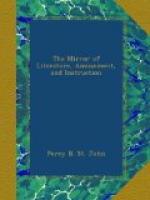The eulogies of the poets in regard to this amiable trait in the female character, are sublime and beautiful; but none, I think, have surpassed in vivid fancy and depth of feeling, that of Lord Byron, in his elegant poem of the Corsair. The following passage describing the grief of Medora on the departure of Conrad, the pirate, is sketched with the pencil of a poet who was transcendently gifted with a knowledge of the inmost recesses of the human heart:—
“And is he gone,”—on
sudden solitude
How oft that fearful question will intrude?
“’Twas but an instant past—and
here he stood!
And now”—without the
portal’s porch she rush’d,
And then at length her tears in freedom
gush’d;
Big, bright, and fast, unknown to her
they fell.
But still her lips refus’d to send—“Farewell!”
“He’s gone!”—against
her heart that hand is driven,
Convuls’d and quick—then
gently rais’d to heav’n;
She look’d and saw the heaving of
the main:
The white sail set—she dared
not look again;
But turn’d with sickening soul within
the gate—
“It is no dream—and I
am desolate!”
CANTO I.
The description of Conrad’s return from his piratical cruise, the agony of his mind when he finds that his lovely Medora had fallen a sacrifice to her affectionate regard for him, and his sudden departure in a boat, through despair, is equally grand and powerful, and exhibits a fine specimen of the influence of female constancy even on the mind of a man like Conrad, who, from the nature of his pursuits, was inured to the infliction of wrongs on his fellow-creatures.
The anecdote of the behaviour of Arria towards her husband, Paetus, related by Pliny, is one of the greatest instances of constancy and magnanimity of mind to be met with in history. Paetus was imprisoned, and condemned to die, for joining in a conspiracy against the Emperor, Claudius. Arria, having provided herself with a dagger, one day observed a more than usual gloom on the countenance of Paetus, when judging that death by the executioner might be more terrible to him than the field of glory, and perhaps, too, sensible that it was for her sake he wished to live, she drew the dagger from her side, and stabbed herself before his eyes. Then instantly plucking the weapon from her breast, she presented it to her husband, saying, “My Paetus, it is not painful!” Read this, ye votaries of voluptuousness. Reflect upon the fine moral lesson of conjugal virtue that is conveyed in this domestic tragedy, ye brutal contemners of female chastity, and of every virtue that emits a ray of glory around the social circle of matrimonial happiness! Take into your serious consideration this direful but noble proof of constancy, ye giddy and thoughtless worshippers at the shrine of beauty, and know, that a virtuous disposition is the brightest ornament of the female sex.
There is another instance of constancy of mind, under oppression, in Otway’s tragedy of Venice Preserved, in a dialogue between Jaffier and Belvidera, where the former questions her with great tenderness of feeling in regard to her future line of conduct in the gloomy prospect of his adverse fortune. She replies to him with great animation and pathos:




